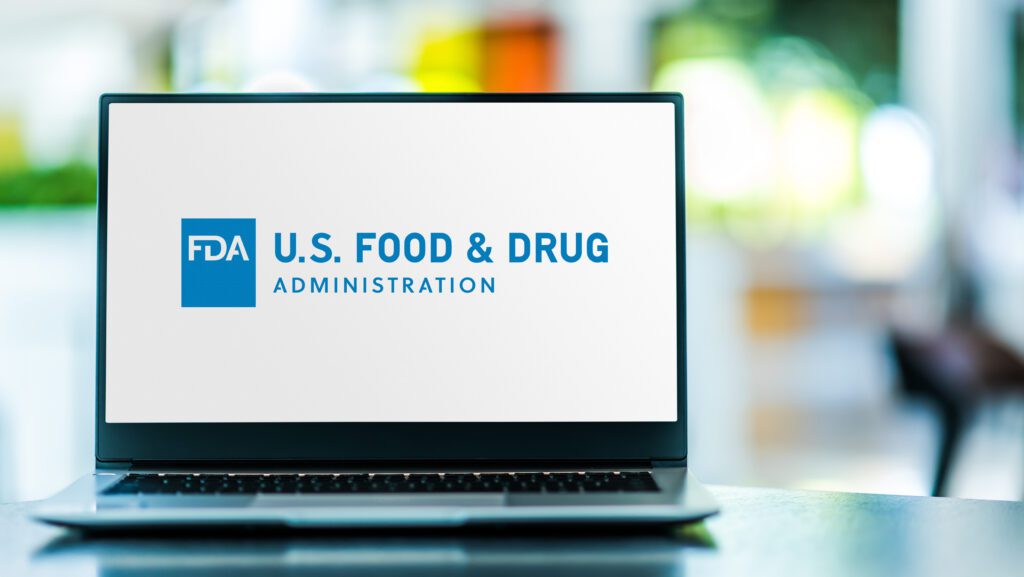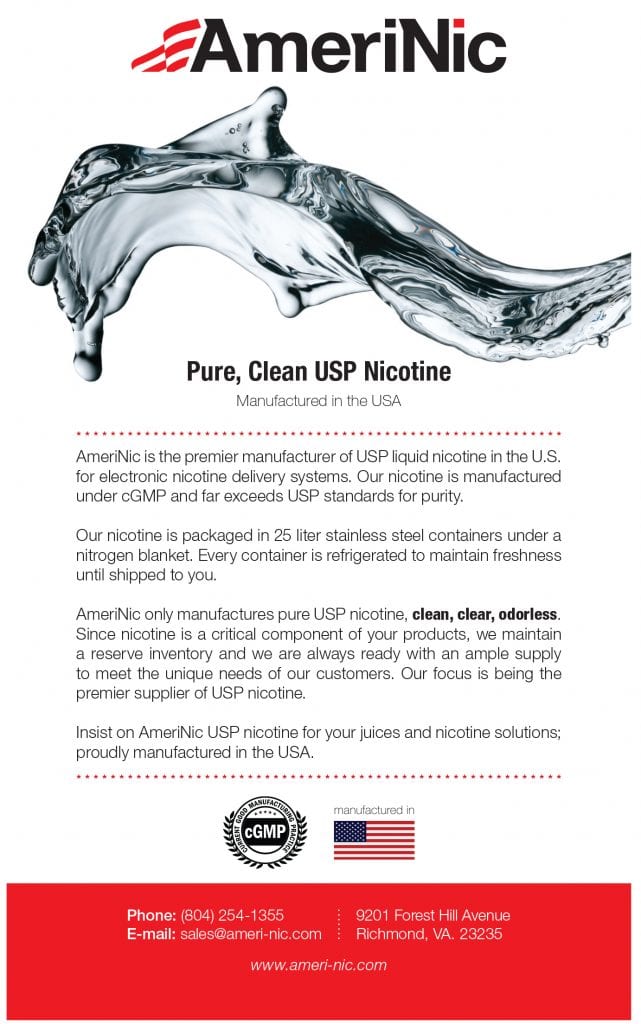
The head of the FDA’s Center for Tobacco Products sent mixed messages during a recent public event.
By VV staff
When the American Vapor Manufacturers (AVM) Association announced it had secured a Q&A session with the Brian King, the industry was taken by surprise. It was the first time King, the director of the U.S. Food and Drug Administration’s Center for Tobacco Products (CTP), would speak with vaping industry advocates publicly and answer questions from the audience. Surprisingly, King was quite candid. He did shy away from certain questions, however, and some of his responses were questionable.

Youth e-cigarette use was first declared a national epidemic in December 2018 by then U.S. Surgeon General Jerome Adams. King said the “FDA has not used that terminology” (epidemic) in its “most recent estimates” of youth use. However, during a hearing of the House Oversight Subcommittee on Economic and Consumer Policy in 2021, then acting FDA Commissioner Janet Woodcock was asked if Juul Labs was “the e-cigarette company most responsible for creating this epidemic.”
She answered that it does “appear” to be the case. The title of the FDA’s own press release was “An Epidemic Continues: Youth Vaping in America.” A 2018 FDA focus group study conducted by the agency reported that “‘epidemic’ ads [had a] perceived effectiveness score of 4.17 out 5.0.” King defended the agency’s youth-oriented anti-vaping ads, which he said were “rigorously evaluated” before and after they aired and were effective at reaching teenagers. King ignored that the ads continue to use the FDA’s approved youth vaping “epidemic” terminology.
“So, I believe you’re thinking about the CDC [U.S. Centers for Disease Control and Prevention]. And FDA has not used that terminology to view the most recent estimates of youth use. I will say that I’m an epidemiologist by training, so I’m fully cognizant of the definition of an epidemic, which is unprecedented increases over what you’d expect at baseline,” said King. “That said, I think, no, that science has shown a decline in the number of youth users. And that’s a good thing. Over the past couple of years, we have seen [a] decline since the peak in 2019. It’s still too high.
“Since I’ve started, I have not [used the term]. I’m not aware of any of my staff. But as far as I’m aware, we have not used the term. It’s ultimately up to respected individuals. There’s certainly disagreements among epidemiologists. Like there is in any discipline, you’re going to find people disagree.”
It should be noted that King’s disdain for vaping is well-documented. King is credited with creating the term “e-cigarette or vaping product use-associated lung injury,” or EVALI. The term was used by the CDC for the lung injuries caused by the 2019 spread of illicit THC cartridges tainted with vitamin E acetate during King’s tenure at the CDC. The name suggested that nicotine vaping products (e-cigarettes) were responsible for at least 70 deaths attributed to black market THC products. No nicotine vaping device has ever been associated with an EVALI death or any death; however, King and the CDC have never tried to correct the misinformation.
The event was moderated by AVM Vice President Allison Boughner and its director of legislative and external affairs, Gregory Conley. When the moderators asked King if the FDA had ever identified a single nicotine vaping product, not an illicit THC cartridge (referencing EVALI deaths), that could be more hazardous than combustible smoking, King dodged the question.
“I would say that at present, we evaluate the merits of evidence that has been submitted to this agency. In terms of applications and science on their products, at present, we have authorized 23 e-cigarette products or devices that we have found and that benefits outweigh the risks,” he explained. “And we’ll continue to do that. The onus is on the applicants to submit that information. And we’re fully open to evaluating that information and then making an informed scientific decision.”
Being more direct, moderators asked King if vaping products are far less hazardous than smoking cigarettes and if that is something consumers should know. “I would agree with the statement that if an adult smoker were to transition completely from a cigarette to an e-cigarette, that would be a benefit to their health, yes,” King responded. Moderators then questioned whether it was ethical to mislead the public, letting people believe that vaping isn’t safer than smoking cigarettes.
“Although we know that in general, e-cigarettes have lower risks than a conventional cigarette, there’s a broad class, and there’s a lot of different factors that can influence the extent of risk. And so it’s not just a simple statement that every single e-cigarette is going to be lower risk,” King said. “There are different factors that we have to consider, particularly when it comes to risks to vulnerable populations like kids.”
Fighting misinformation

King acknowledged that vaping has been effective at helping smokers quit smoking. He added that the FDA and CTP don’t want people using combustible cigarettes. Combustible products introduce 7,000 chemicals and 70 carcinogens into users. However, the misinformation surrounding vaping products is massive. King acknowledged that he is “fully cognizant” of the misperceptions.
“I am wholly open to enhanced efforts by the Center for Tobacco Products to message not only on the continuum of risk but also misperceptions related to nicotine,” he said. “But again, the devil is going to be in the details there in terms of making sure that we have scientifically defensible messages and that we’re delivering it to the target population, which is adult smokers, and not inadvertently delivering it to the unintended populations where there’s consequences, including youth.”
The FDA’s fight against misinformation is confusing at best. For the last several years, former CTP Director Mitch Zeller and several CTP employees have repeatedly stated in public that correcting misperceptions surrounding vaping and nicotine are part of the CTP’s agenda. King seemed to imply that little had been done so far in accomplishing that goal. He said that little had been done, and that was due to competing priorities at the CTP.
“When you have a finite number of resources and people, you have to prioritize what you do to have the greatest impact. And so, I will say that for my part, coming into this position, there’s four key tenants that I am adhering to, and that’s strong science, stakeholder relations, communications and health equity,” King said. “And so, obviously, the stakeholder relations and communications are pivotal to this. In terms of my prioritization, I think it’s important that we engage with people, hear them out, but also use science to inform our communication strategies moving forward. It’s not that we haven’t done this work before but it’s just where prioritization is moving forward. And I can tell you that we’re working on it.”
Concerning misperceptions and the FDA’s message in the public arena, moderators questioned King on the FDA’s advertising. FDA ads have portrayed vapers as being possessed by demons or shapeshifting metal dragons, and vaping will cause huge parasites to crawl through your skin. None of these things have ever been reported as being true. King said that the agency does a “rigorous evaluation” both before and after the implementation of any of its campaigns, and all of the FDA’s youth-centric campaigns have very targeted strategies to reach that target population.
“We cognitively test them and do science in the beginning, and then we evaluate them on the back end. And that science has shown demonstrably that there is a beneficial impact. That said, I think that we’ve got opportunity for better public engagement on our campaigns,” he said, which didn’t really provide a clear answer to the question. “That is a critical component of our work. We don’t function in silos, and we want the opportunity to engage, but we’ve got to give people that opportunity. And if they’ve got data, if they’ve got evidence to demonstrate that a certain message or a certain target audience is going to be problematic in terms of the campaign, we welcome it.”
Illicitly speaking
 Bans on consumer goods haven’t worked well historically. Prohibition of alcohol and marijuana led to massive black markets for those products. U.S. states that have enacted tobacco flavor bans, such as Massachusetts, have seen a huge increase in black markets. King said this depends on how an illicit source is defined. He added that any vaping or other tobacco product on the market that does not have FDA authorization is considered illegal, and anyone selling those products is operating in the black market.
Bans on consumer goods haven’t worked well historically. Prohibition of alcohol and marijuana led to massive black markets for those products. U.S. states that have enacted tobacco flavor bans, such as Massachusetts, have seen a huge increase in black markets. King said this depends on how an illicit source is defined. He added that any vaping or other tobacco product on the market that does not have FDA authorization is considered illegal, and anyone selling those products is operating in the black market.
“In terms of our enforcement and compliance strategy, we’re committed to taking action to address those that are violating it. And that can take a broad spectrum of action, whether it’ll be warning letters all the way up to civil money penalties as well as injunctions,” he said. “But we have an obligation to enforce the law. And that’s what we will do. That is what Congress has told us to do. And so we’re committed to continuing to do that. But in addition, we’re also working to make sure we get efficiencies and ramp up our efforts around reviewing applications.”
When questioned whether he had concerns about the black market continuing to grow, King said the CTP is committed to continuing to review premarket tobacco product applications as quickly as possible to guarantee a clear pathway to a marketing order. He’s also equally committed to making sure that the regulatory agency enforces the law. He says he’s committed to continue to implement the law.
“This is what Congress has told us to do. We have specific authorities that we are responsible for, and in my job as the director [of the CTP], I have to make sure that we exercise those authorities, and toward that end, I don’t think we’re perfect,” said King. “I think we’ve got opportunity for improvement. I think that there’s always [an] opportunity for improvement. We acknowledge that. I think we can do some things better, and from our part, I’m happy to continue to move us into the next chapter of the center to make sure that we’re engaging people in a meaningful way.”
On the enforcement front, King was asked why only small businesses bore the brunt of FDA action. King said that the CTP does not have a policy against small business and that its enforcement compliance actions have been taken against small and large businesses. However, one participant explained, many small businesses don’t have the finances to hire lawyers to petition the courts to fight the FDA. They also question whether the FDA would ever approve open-system products, which are mostly sold by independent vape shops.
“We’re committed to enforcing the law. I will say that some of the recent actions in terms of the civil money penalties and also the injunctions were a result of companies that did not obey the law after repeated warnings. And there are many small businesses that are obeying the law and have submitted their applications and have gone through the process,” said King. And so it’s certainly possible. I will say that for our part, we’re committed to continuing to explore opportunities where we can better provide information to applicants to make sure that the process is as flexible and straightforward as possible.”
A bad taste
During the open question session, one participant questioned whether the FDA would ever approve a flavor other than tobacco. The business owner wanted to know if the FDA intended to have an outright ban on flavored products or any open system with potential for flavored e-juice options. King said the CTP does not have an outright ban on flavored products, but the onus is on the applicants to submit the evidence to demonstrate that the benefits among adult smokers outweigh the risks to youth.
“So, there is no de facto policy within this center that would prevent the authorization of a flavored e-cigarette. But I will say that with continued high rates of youth use, the onus is high to make sure … to demonstrate that benefit to adult smokers,” King said. “But it’s not impossible. We’ve seen the authorization of several products already, all tobacco flavored, but we are certainly open to applications on flavored products.
“And if the science demonstrated that there was a net benefit compared to the risk, we would authorize it. And so that’s my take-home here [that] there’s no blanket policy against flavored, but we’ve got to follow the science, and at present, we have not got sufficiently strong evidence that demonstrates that the flavors are needed for the adult smoker to quit.”
King was also asked about memos submitted to the U.S. Court of Appeals for the 3rd Circuit but an attorney for Logic Technology showed that King reversed a recommended marketing approval of Logic Technology’s menthol vaping products, ignoring the advice of FDA scientists. King said that that was an “erroneous description” of what occurred. It was not an overrule.
“In this case, there was [an] initial assessment of that science, and then there was further scientific discussion. And I am a scientist by training. I have been for many, many years. And we sat down and discussed the merits of the available science that was presented,” explained King. “And after the discussion of that science and those merits, the determination was made that the applicant did not meet the standard.”
A recent report published in the journal Addiction examined e-cigarette use in England among young adults between 2007 and 2018. That study concluded that 18-year-olds to 24-year-olds who use e-cigarettes did not use vaping as a gateway to smoke combustible cigarettes. King was asked about the study and whether he believed a “gateway effect” existed despite evidence that one did not. King responded that there’s still a strong body of evidence that suggests that the gateway does exist, but it’s dependent on a variety of different factors.
“[It’s] certainly not conclusive evidence, but there’s moderate evidence to demonstrate that [a gateway exists]. But you also have to look at the net impact of the science. And so I’ve said publicly many times that you do have some gateway effects. We’ve seen that through the past study and others, but that doesn’t mean that every single kid who’s using an e-cigarette is going to go on to smoke,” King explained. “There’s a variety of factors that impact that. So I caution folks against definitive statements like that, that every person is going to transition who uses the product. It’s certainly happening. But when you look at the net effect, we’ve definitely seen a decline in overall e-cigarette use.”
In the end, King said that the one thing people should realize is that he’s the type of person who speaks plainly and honestly. He doesn’t have the stereotypical characteristics of a civil servant. “If there’s anything that folks know about me, it’s I aim to be the most nonbureaucratic bureaucrat that you’ve ever met, and that involves just straight-shooting. And so, if we can do better, I want to know about it, and we can definitely enhance the communication on that front,” explains King. “So, I would say more to come, but the science is going to drive it. And we’re at the initial stages in informing what effective messages are most critical to reach the target audience without unintended consequences.”


